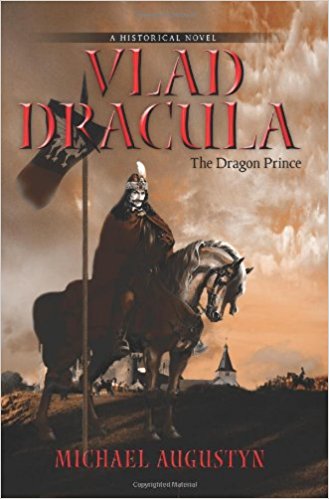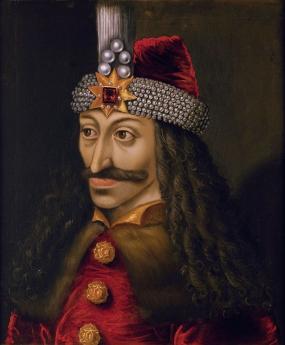Related Topics
Right Angle Club 2017
Dick Palmer and Bill Dorsey died this year. We will miss them.
Dracula

|
| Vlad Dracula: The Dragon Prince |
The Right Angle Club was honored recently to be addressed by Michael Augustyn, who is a sort of amateur expert on Medieval history and warfare as a result of gathering background for his historical novel Vlad Dracula: The Dragon Prince. He didn't talk much about his novel (which is unusual for an author) but gave a sickening description of Medieval warfare, and a fascinating one.
It seems that Ghengis Kahn invented or exploited the invention of the stirrup, which allowed hordes of horseback Mongols to defeat the armored knights of the Western world. But before that, the Turks invading westward had discovered that if you unhorsed the knight into the mud, you could then make short work of him. In those days, the Byzantine Christians were bitter enemies of the Roman Catholics for one reason or another, but the invading Turks didn't make much distinction and beheaded Christians indiscriminately. Among other charming customs, they catapulted the heads over the walls into the midst of the Christian defenders of castles and walled cities, to soften them up, so to speak.

|
| Vlad Dracula |
Today, we regard the death penalty as the most extreme punishment, and some groups are even agitating to eliminate it entirely. But for the Turks, the death penalty was only third in rank, preferable to being blinded in one of three painful ways, or to being impaled on a crooked stick. It wasn't described in great detail, but presumably, the crooked stick thrust up the rectum would perforate the colon, and the resulting peritonitis would protract death for two or so weeks. Mr. Augustyn was definitely anti-Turk, but one presumes imitation is the soul of flattery, and plenty of Greeks impaled plenty of Turks, once they got the hang of it.
Dracula was a leader in Transylvania, now part of Romania, and is now generally treated as the Robin Hood of the region for his defeats of the invaders, not described in detail but probably pretty grisly. Evidently, his evil reputation originates in the hatred between Roman Catholics and Orthodox, which sort of persists to this day. Even in modern times, people will justify their hatreds by referring to atrocities between the Serbs and their neighbors in 1328. When President Clinton sent American troops into the Balkans, including the First City Troop of Philadelphia, there was abundant evidence of contemporary hatreds and atrocities attributed to 1328, which must have been pretty notable. It reminds me that sailing the Atlantic Ocean in a wooden ship to immigrate here has the virtue of obliterating such fables and allowing even Balkan immigrants to forget them. The jet plane keeps these antagonisms fresher.
As I sat there listening to this, it occurs to me that I don't even know for sure what country my ancestors were in, in 1328, so I don't know which ethnic group I am supposed to hate, and if possible, disembowel. There do seem to be some advantages to forgetting about history, don't there?
Originally published: Sunday, March 19, 2017; most-recently modified: Thursday, May 16, 2019